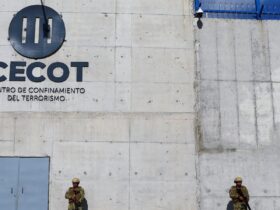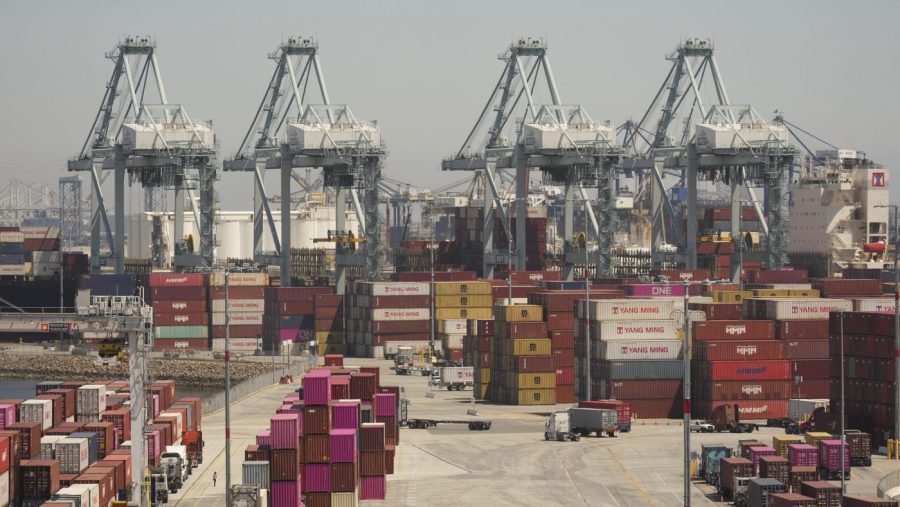Financial markets soared on Wednesday after President Trump issued a 90-day pause in almost all the tariffs that had roiled the global economy during the past week.
The key exception was China, which had notably declined to back down from Trump’s threats and had issued its own retaliatory tariffs in response. The president announced a further elevation of the tariff rate on China, to a massive 125 percent.
Here are the big takeaways so far.
Trump blinked
The bottom line here is that Trump has backed down.
His capitulation is not total, as the elevated tariffs on China show. But the central point is that the economic and political pain being inflicted as markets melted down over the past week clearly became too much to bear.
Speaking from the White House on Wednesday afternoon, Trump acknowledged that people had been getting spooked — “a little bit yippy,” as he put it — by the turmoil in the markets.
That left Trump with two suboptimal choices: Try to weather the storm or make a U-turn and then put the best possible spin on it.
In the end, he chose the second option. His social media post announcing the change led with the China news, but the announcement of the 90-day pause was the market-mover.
Even though Trump said the story was not “over yet,” he also often talked in the past tense about “what we did” and how proud he was “to have done it.”
The suggestion is fading fast that tariffs would be held in place for the years required to potentially speak a resurgence of American manufacturing.
White House puts its best spin forward
Trump’s spin includes claiming that “more than 75 countries” have been in contact with the U.S. seeking to negotiate deals.
Whether or not that is true, there was no single major deal reached before Trump put his sweeping tariff threat on hold.
Treasury Secretary Scott Bessent, speaking at the White House in the wake of Trump’s announcement, said that there would now be “bespoke” negotiations with other nations during the pause.
The climbdown was also a victory for those inside and outside his administration who had been arguing for this course of action.
On the winners’ side here are Elon Musk and billionaire Trump backer Bill Ackman, while the shift is a de facto defeat for figures like Peter Navarro, the pro-tariff adviser with whom Musk, in particular, has feuded in recent days.
Trump will try to claim a victory with any negotiations that will now take place.
Markets enjoy enormous rally
The major stock indices enjoyed massive rallies in the wake of the pause being announced.
The Dow Jones Industrial Average closed up almost 8 percent, the broader based S&P 500 more than 9 percent and the tech-heaving NASDAQ more than12 percent.
That still leaves all three big indices below where they stood when Trump made his April 2 “Liberation Day” tariff announcement.
But it was a hugely welcome development for investors, who saw more than $6 trillion wiped off the aggregate value of US stocks on Thursday and Friday of last week alone.
The price of oil, which had also fallen sharply amid fears of a global economic slowdown also rallied.
Clouds of uncertainty remain
Questions remain on key points.
One is, what will happen with China?
Each side has ramped up the trade war in recent days, and Beijing has been emphatic that it won’t back down.
Earlier this week, China’s Commerce Ministry accused Trump of bullying and said that China would “fight to the end.”
Trade in goods between the United States and China last year totaled more than $500 billion.
There was also some confusion over whether Canada and Mexico would be subject to the 10 percent baseline tariff that will still go into effect. Those two nations had been excluded from Trump’s April 2 list.
The Canadian Broadcasting Corporation (CBC) reported late Wednesday afternoon that after a “confusing day,” it appeared that the 10 percent levy would not affect Canada or Mexico after all.
Republicans sigh with relief, Dems try to capitalize
Trump’s pursuit of a hard line on tariffs had been causing growing consternation among Republicans on Capitol Hill.
Some, like Sen. Ted Cruz (R-Texas), had expressed the view that any new tariffs ought to be short-lived.
Others flagged their dissent in different ways, like the seven GOP senators who voted with Democrats for a measure that would have returned much of the power to set tariff policy to Congress.
Cruz praised Trump’s Wednesday announcement as “terrific news” in a social media post. Sen. Thom Tillis (R-N.C.), one of the seven senators who backed the tariff measure, said it was “the right decision.”
Democrats took vindication — and some glee — from Trump’s de facto climbdown.
Senate Minority Leader Charles Schumer (D-N.Y.) wrote on social media that Trump was stepping back “because of [the] Trump slump.”
Sen. Amy Klobuchar (D-Minn.) wrote that Trump had “finally realized what the world has known for more than a week: his $4,000 per family tariff taxes are a disaster.”
And California Gov. Gavin Newsom (D), often spoken about as a potential 2028 presidential candidate, said “Trump caved. He will change his mind again.”
















Leave a Reply